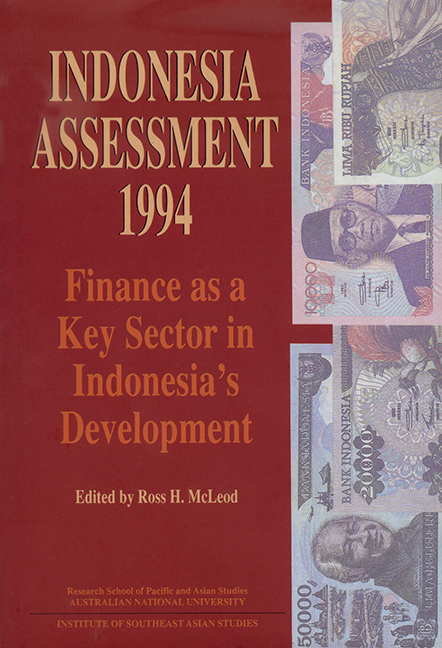Book contents
- Frontmatter
- Contents
- Tables, figures, appendices
- Foreword
- Glossary
- Contributors
- Acknowledgements
- 1 Introduction
- PART A ECONOMIC AND POLITICAL DEVELOPMENTS
- PART B FINANCE AS A KEY SECTOR IN INDONESIA'S DEVELOPMENT
- I The Reform Process
- II Monetary and Exchange Rate Policy
- III Banking Sector Reforms
- 8 Banking sector reforms in Indonesia, 1983-93
- 9 Bank soundness requirements: a central bank perspective
- 10 Bank soundness requirements: a commercial bank perspective
- 11 The case against deposit insurance in Indonesia
- IV Domestic and International Capital Markets
- V Small-scale Finance
- References
- Index
9 - Bank soundness requirements: a central bank perspective
from III - Banking Sector Reforms
Published online by Cambridge University Press: 21 October 2015
- Frontmatter
- Contents
- Tables, figures, appendices
- Foreword
- Glossary
- Contributors
- Acknowledgements
- 1 Introduction
- PART A ECONOMIC AND POLITICAL DEVELOPMENTS
- PART B FINANCE AS A KEY SECTOR IN INDONESIA'S DEVELOPMENT
- I The Reform Process
- II Monetary and Exchange Rate Policy
- III Banking Sector Reforms
- 8 Banking sector reforms in Indonesia, 1983-93
- 9 Bank soundness requirements: a central bank perspective
- 10 Bank soundness requirements: a commercial bank perspective
- 11 The case against deposit insurance in Indonesia
- IV Domestic and International Capital Markets
- V Small-scale Finance
- References
- Index
Summary
In this paper I will try to present a candid overview of the current state of the banking scene from the viewpoint of the central bank, while my colleague, Mr Manggi Habir (Habir, this volume), will present private sector observations. I hope this will be helpful, because the strength of any banking and financial system derives not only from the spirit in which it is established, but also from the maintenance of an open dialogue between all of its participants.
My presentation will begin by outlining the reasons for, and objectives of, the process of bank deregulation, and then turn to discuss the problems faced by the central bank as a result of this deregulation and the steps we are taking in order to deal with them.
The deregulation process: rationale and objectives
Let me begin by re-capping the history of deregulation in the Indonesian banking sector. This process has been implemented step by step over the years, beginning in June, 1983, when Bank Indonesia (BI) liberalised interest rates for both borrowers and depositors; phased out ‘liquidity credits’ (i.e. subsidised refinancing of bank loans); and eliminated the ceilings which had been imposed on bank lending. A market-oriented approach to monetary control was adopted that relied more on the development of indirect monetary instruments such as BI certificates (SBIs), introduced in 1984, and money market securities (SBPUs), introduced in 1985. These two instruments enabled BI to implement its monetary policy using open market operations, but the instruments also served as alternative earning assets for the banks in absorbing their excess liquidity.
The initial reforms had several positive effects on the economy- Most important, the new money market instruments enabled the government to provide a flexible monetary dimension with which to better control important economic variables, such as inflation, interest rates, and capital flows. Moreover, with continuing rapid economic growth, it was necessary for the government to create appropriate conditions for the further development of the banking and finance sector.
- Type
- Chapter
- Information
- Indonesia Assessment 1994Finance as a Key Sector in Indonesia's Development, pp. 158 - 170Publisher: ISEAS–Yusof Ishak InstitutePrint publication year: 1994



